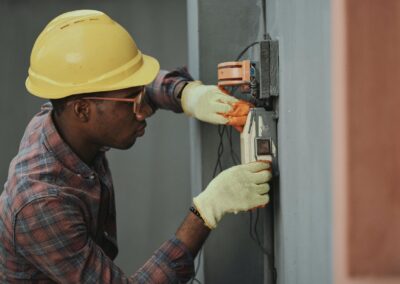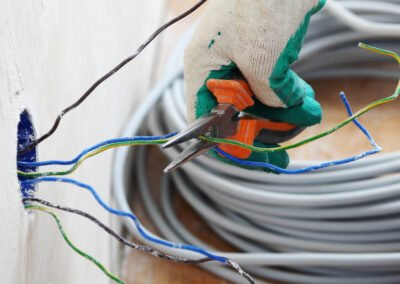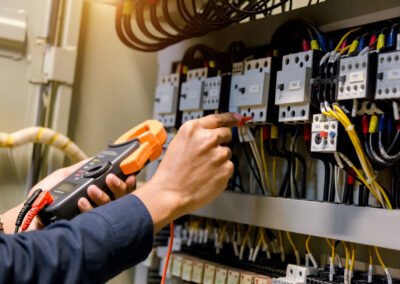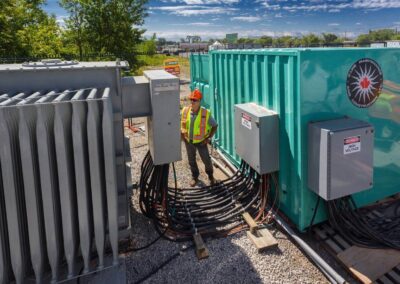Mobile Commercial Wiring, Mississauga
Though electrical wiring in a residential facility is a fairly straightforward procedure, wiring for a commercial property is usually more complex, and requires the expertise of a skilled and knowledgeable electrician.
Request InformationSchedule Service
Mobile Commercial Wiring, Mississauga
An experienced electrical contractor is needed to complete complicated electrical wiring projects in both residential and commercial buildings. This is crucial because it assures adherence to the Electrical Safety Authority’s (ESA) electrical code and the property’s and all of its occupants’ safety. A competent electrician can usually complete electrical wiring projects with ease, but wiring a commercial building might be more complicated and more involved than wiring a home. Electrical wiring is set up in commercial buildings to support any heavy gear or equipment that will be utilized there.
Raceways and conductors, busways, and cable assemblies are the three primary techniques for electrical wiring in commercial structures.
Cable Assemblies
A cable assembly is one of the most popular styles of commercial electrical wiring. Multiple insulated and neutral phase conductors are used in cable assemblies, together with an insulated or bare grounding conductor for the equipment. Custom cable assemblies are available and typically use copper or aluminium conductors that are either THHN/THWN (thermoplastic high heat-resistant nylon jacket) or XHHW-2 (XLPE high heat-resistant and water-resistant nylon jacket).
Utilizing cable assemblies has a few benefits over conventional wiring techniques, including flexible cable routing, rapid installation times, and cheaper installation costs. The fact that circuit layout adjustments are not feasible once installation is complete and that considerable preparation is necessary during the setup and cable procurement stages is, on the other hand, a drawback.
Raceways and Conductors
When it comes to electrical wiring, the raceway and conductor system is another one that is frequently employed. Typically, a conduit or tube with an equipment grounding conductor and numerous shielded phases is used when using raceways and conductors. The actual design and installation will vary based on the demands and requirements of the commercial building, as is the case with all forms of electrical wiring. The most popular conductor types, like cable assemblies, are copper/aluminum THHN/THWN or XHHW. Typically, feeders are made of aluminium while branch circuits are made of copper.
Raceways and conductors have the benefit of allowing for circuit layout adjustments, and they are simple to apply for remodelling projects. On the other hand, some drawbacks include more expensive installation expenses in comparison to alternative wiring systems and a challenging installation procedure because of stricter routing specifications.
Busways
A busway is an enclosed raceway with factory-mounted busbars. The busways may accommodate bare or insulated conductors and are typically set up in one of two ways: feeder style or plug in style. The busway technology is useful because it can handle ampere ratings ranging from 60 to 4,000 A and is more compact and smaller in size than several conduits. Additionally, with busways, the overall voltage loss has less of an effect. Busways have a greater installation cost than other alternatives, and they are more prone to collapse as a result of internal water leakage. Additionally, there might not be enough room to put bus plugs depending on how the area is laid out.
Though these three commercial wiring methods are most commonly used, there may be other alternative methods available. Here at Made Electric, we can guide you through all possible wiring methods and advise you on the best configuration for your commercial property. Don’t hesitate to contact MADE ELECTRIC today! We are an ESA licensed company with years of experience, and we provide quality service in both commercial and residential areas. Our team operates within Mississauga and the GTA, and we are committed to helping meet all of your needs.
Frequently Asked Questions (FAQs)
How does commercial electrical rewiring differ from residential electrical wiring?
While most residential projects require single phase power, commercial wiring typically uses 3-phase power. Residential electricians can work on electrical systems which are smaller than commercial systems, with a voltage as high as 240V, while commercial electricians work on wiring systems which are much larger and complex.
Which electrical wiring method is best for my commercial property?
The three main methods for electrical wiring in commercial spaces are raceways and conductors, busways and cable assemblies. If you are unsure of which method is best for your property, don’t hesitate to contact us and we can advise and guide you through the installation process.
Are there other types of wiring methods for commercial properties?
The three main methods for wiring commercial properties (raceways and conductors, busways and cable assemblies) are the most commonly used methods in industry. However, alternate configurations are possible, and we will work with you to find a custom configuration that suits your property best.




